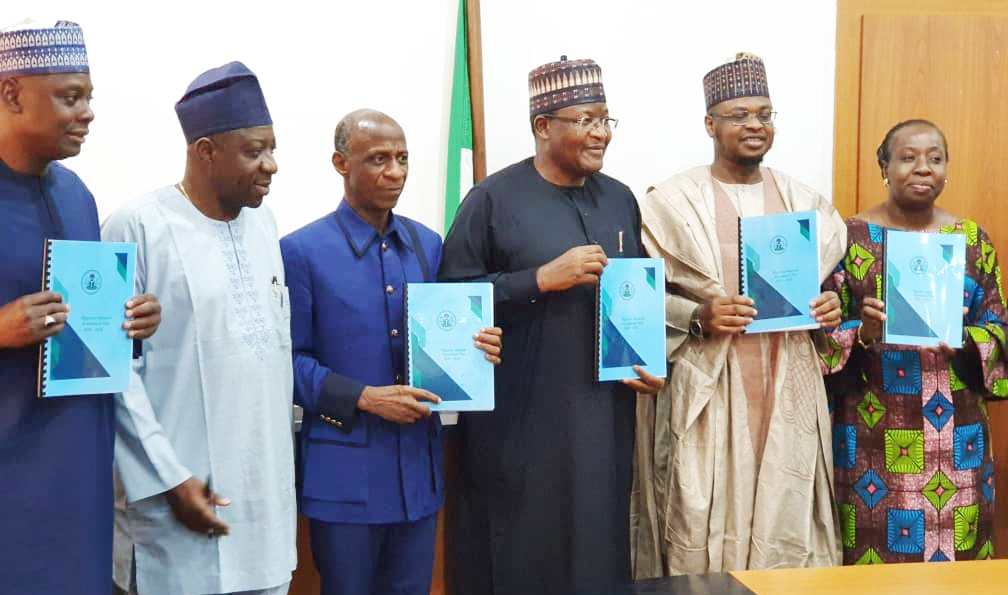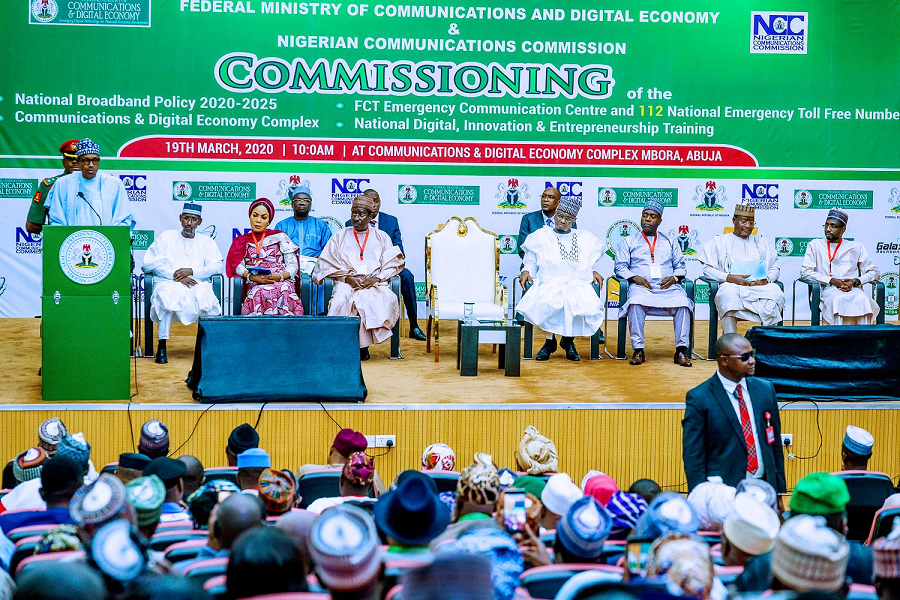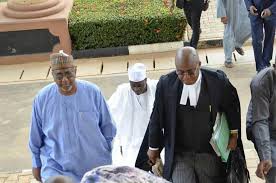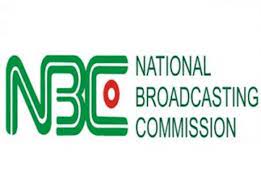What can best be described as Nigeria’s strategic roadmap to digital economy spanning from this year to 2025, was Thursday in Abuja launched by President Muhammadu Buhari with strong caution against poor implementation by government agencies and stakeholders’ in the industry.
Known as the new National Broadband Plan 2020-2025, Business Hilights gathered that it embodies strategies that will accelerate broadband penetration to facilitate the growth of Nigeria’s Digital Economy.
The launch, which took place at the Federal Ministry of Communication and Digital Economy Complex in Abuja, is supervised by the President Buhari, who equally commissioned other infrastructures such as Emergency Toll Free line (112) and flag-off of the National Digital Innovation and Entrepreneurship Training.
In his address, elated President Buhari made it clear that globally, broadband penetration remains a prerequisite and springboard to boosting digital economy, financial inclusion and seamless economic development.
It would be recalled that the Minister for Communication and Digital Economy, Dr Isa Ali Pantami, had in December 2019, commissioned a 25-man committee comprising of industry experts and stakeholders from the government, public and private sectors, headed by Ms Funke Opeke, Managing Director/CEO of Main One Cable Company Limited, to coordinate the development of the new National Broadband Plan targeted for the next five years (2020-2025).
Fact checks on the new NBP showed that it contains series of guidelines and strategies, new technologies and solutions that can be leveraged to advance broadband penetration up to a 70 per cent coverage against the current coverage rate of 38 per cent before the terminal date of 2025.
The core federal agency in charge of its implementation, the Nigerian Communications Commission (NCC) is already developing a framework for Television White Space (TVWS), an unused broadcasting spectrum which can provide affordable broadband services to people at the grassroots when deployed.

The Ministry, in conjunction with the commission had on Tuesday, organised an Industry Stakeholder Forum on the Guidelines on the use of TVWS in Nigeria, at the Commission’s Head Office in Abuja. The forum focused on finalising the draft Guidelines on the deployment of the technology, in line with the Commission’s commitment towards bridging the digital divide between different strata and sectors of the society with contributions from and feedback from attendees.
At the stakeholders forum, Dr Pantami had made it clear that “The whole world is about Digital economy; it is because of this we discovered that you cannot promote digital Economy without broadband and if you look at our un-served and underserved areas, the earlier we reach out to them by providing broadband the better for the Digital Economy”, he observed.
“It is because of this that NFMC urged both to work together for the practical utilisation of TVWS, which also supports the expanded mandate of the Ministry towards advancing government’s vision of promoting the digital economy”.
“The framework directly addresses two of the eight pillars of NDEPS, which are pillar one and three focusing on developmental regulations, and solid infrastructure, which has broadband access as a central component,” he said.
In his further submission at the forum, the Minister lauded the efforts of NCC and NBC coordinating the stakeholder forum gathering experts’ inputs before concluding work on the TVWS regulations. He also called on all stakeholders not relent in all activities in pursuance of the objective, which is Digital economy.

(There meeting was a follow-up to discuss how to address the issue of Right of Way (RoW) and other similar challenges confronting the telecoms industry. You will recall series of report you have done in recent past around the issue of RoW).
However, industry analysts, who reviewed the previous NBP had picked holes on two critical issues which the plan failed to address within the period under review which were issues of Right of Way (RoW) and industry multiple regulation.
The former NPB had noted that “Operators have stated that the cost for procurement of Right-Of-Way (ROW) for laying fibre and for procuring sites for base stations has been prohibitively expensive and that the process is time consuming. Indeed available data shows that the cost of obtaining ROW could account for as high as 50% to 70% of the total cost of deploying fibre in various states of the Federation. Lengthy approval times (in some cases up to two years), also contribute greatly to delays and escalation of costs in rollout of broadband networks. Despite the fact that sufficient international bandwidth capacities have been achieved with multiple international cable landings to the shores of the country, excessive upfront charges for rights-of-way for national fibre optic cable roll-out initiatives, have hampered efforts to extend these capacities inland to reach all parts of the country.”
Also on issues of multiple regulations, the previous Plan revealed that “While the Nigerian Communications Commission, NCC is identified under Nigerian Communications Act as the regulator for telecommunications and therefore broadband, there are other agencies at different tiers of government whose regulatory oversights are incidental to public ICT/Broadband infrastructure. These include Federal, States and Local Government MDAs on Environment, Aviation, Town Planning and Consumer Protection.”
It decried clearly that “All these agencies in carrying out their statutory functions individually occasionally try to enforce special rules for the deployment of broadband infrastructure leading to multiple approval processes being required and conflicting standards being imposed. Operators being required to get permits from several regulatory bodies can be unduly onerous, costly and time consuming. Industry regulators and regulation shall be assessed and streamlined.”
However, as the 2020-2025 NBP takes centre stage, Business Hilights Abuja Bureau Chief reports that it remains the wishes and aspirations industry players that these two monsters which clearly frustrated the previous plan would be adequately contained by the provisions of the new National Broadband Plan 2020-2025 as launched in Abuja on Thursday, 19 March 2020.









